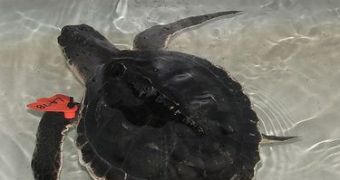Scientists released the first sea turtles rescued and rehabilitated from the Deepwater Horizon oil spill's effects yesterday, near Cedar Key, Florida.
Dr. Jane Lubchenco, NOAA administrator, and Admiral Thad Allen, along with state, federal and partner biologists released 23 Kemp's ridley sea turtles back into Florida’s Gulf coast, a region that was never oiled and with a habitat that gives these turtles everything they need.
Barbara Schroeder, NOAA’s national sea turtle coordinator said that “This area near Cedar Key provides excellent habitat for Kemp’s ridley sea turtles and has long been known as an important habitat area for this species.
“Thanks to the efforts of our rescue teams and rehabilitation facility partners all of the turtles we released today have an excellent chance of surviving in the wild and contributing to the recovery of this species.”
These turtles were rescued by NOAA and Florida Fish and Wildlife Conservation Commission teams, along with the Riverhead Foundation and the In-Water Research Group.
They received treatment, cleaning and de-oiling at the Audubon Aquarium in New Orleans, and at Gulf World in Panama City, Florida, and were then cared for by SeaWorld Orlando, Mote Marine Laboratory, and the Florida Aquarium.
Dr. Lubchenco said: “I'm pleased that Admiral Allen and I were able to assist with the release of these turtles, and we thank all of our partners in this rescue and rehabilitation effort.”
Senator Bill Nelson of Florida said that “It’s wonderful news that sea turtles hurt by the Deepwater Horizon spill are now rehabilitated and ready to go home to the Gulf of Mexico.
“This is a testament to the hard work of fish and wildlife agencies and our wildlife rescue and rehabilitation centers.”
Almost 500 live turtles were rescued during the Gulf oil spill and over 450 stranded or captured turtles had visible traces of oil.
To date, about 350 turtles are still in rehabilitation facilities and will be released once there is no more danger to their health.
Gil McRae, director of the Florida Fish and Wildlife Conservation Commission’s Fish and Wildlife Research Institute stated: ”This is a great day for our biologists since many of these turtles were originally rescued by our staff.
“Everyone involved has worked hard to ensure that these endangered turtles are returned to the wild so they can contribute to the overall population.”

 14 DAY TRIAL //
14 DAY TRIAL //